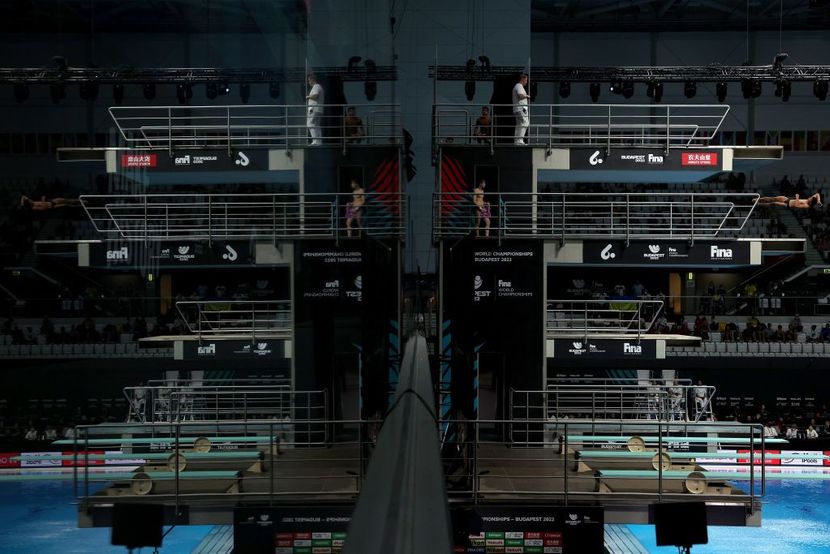
FINA’s development programme started more than 20 years ago with a one-million-dollar annual budget but since has dramatically increased the number of initiatives, the scope, and the annual allocation to help National Federations provide opportunities for aquatic managers, coaches, officials, and athletes.
One of the most important FINA Development programmes is the FINA Scholarship which started with the expressed aim of providing financial and technical support to help athletes qualify for the FINA World Championships and Olympic Games.
FINA works hard to support the best athletes in many countries, where otherwise they do not have any possibilities to train at a high level. Athletes are provided with opportunities to train at FINA development and training centres or to remain in their home countries with better training environments,” FINA Development and Education Manager Vita Balsyte said. “Success of the athletes in reaching their full potential is essential to FINA.”
Launched in 2013, the FINA Scholarship programme booked initial success with scholarship swimmers qualifying for the Rio 2016 Olympic Games. The project has now been extended to include athletes from the diving and open water disciplines, with the application process now starting for the first group of grants for artistic swimming teams.
In the case of the divers, athletes travel to live and train at one of the three FINA Training Centers. This year, more than one hundred athletes have been awarded FINA Scholarships. This week in Budapest, several of the current and past FINA Diving scholarship athletes are competing at the 19th FINA World Championships.
India’s Siddharth Pardeshi is excited to compete at his second FINA World Championships as he looks to show improvement in the 10m Platform here. Pardeshi noted that the facilities and technical he now had access to were excellent for his sporting advancement.
“The infrastructure for Diving is missing in my country and I have not the opportunity to compete at enough competitions;” Pardeshi said. “It changed me as an athlete.”
However, Pardeshi admitted that he struggled to adapt to the different culture, especially the food and the language.
Cuban Carlos Ramos Rodriguez shared a similar sentiment saying, “It took a little while to adjust because it was very different from what I was used to in Cuba. I learned new dives in all events and became much more confident in all dives. I was always a little bit nervous about doing certain dives, missed the confidence, but that has changed.”
Also at his second FINA World Championships, Rodriguez is looking to improve on his score and rank in the 10m Platform.
Having continuous communication with the athletes and coaches is central to providing the best training environment for the FINA Scholarship athletes, Balsyte explained.
“We are looking at different opportunities to provide education options, like for example the program we just started with the Hungarian Government,” Balsyte said. “FINA is getting ready to propose communication, mental health, coaches' certification and similar options for all scholarship holders. It is crucial to create opportunities for athletes to learn about nutrition, training regimen, and personal development so that they can continue to improve when they return to their home countries.”
Frandiel Gomez, who has been representing the Dominican Republic on the world stage since the 2013 FINA World Championships in Barcelona, was impressed by the culture of the sport at the Training Centers. Gomez was pleased that all aspects associated with the development of an elite athlete were addressed, which he thinks has allowed him to grow as an athlete as well as a person.
Diving may be one of the more complicated sports for any National Federation to develop, due to the necessity of Diving installations. Many of the regions are therefore bare in opportunities for diving competitions.
As Gomez pointed out “There was the opportunity to compete every month which allowed me to practice my dives in a competitive situation and my dives became much more fluid. Repeating my dives resulted in me being more confident, more relaxed.”
Pardeshi related that there are no competitions in his country and travel to competitions is very expensive. For these athletes, their experience in the sport has been changed. Their National Federations will need to do their part to provide them with the best possible environment when they return from the Training Centers.
Balsyte expressed optimism that with continuous analysis and improvement of the programme the investment in FINA Scholarship athletes will help progress aquatics in the athlete’s local community and the country as well as on the world stage, thus assisting FINA with its mission to elevate the importance of the aquatic sports worldwide.
“The scholarship holders are the ambassadors for Aquatics in their communities,” Balsyte said. “They can be the change for aquatics, become children and youth coaches, implement projects in their communities and share their knowledge with the younger athletes and coaches when they return to their home countries.”
Venezuelan Jesus Eduardo Gonzalez Reyes is hopeful to make it to a semifinal here in Budapest. This was the first appearance for Gonzalez Reyes at a FINA World Championships after he just missed qualifying for the 2020 Olympic Games.
When asked what he has been doing with the knowledge and information he acquired at the Training Center, Gonzalez Reyes said that “now that I have returned to Venezuela, I have been sharing what I have learned with my teammates and coaches. I learned specific exercises and techniques that I was not aware of before and I am sharing that information, so we can all improve.”
Gomez added: “The way we trained was very different than we are accustomed to. The focus of training is more on dryland than actual pool time. Two hours daily dryland and only one hour in the pool.”